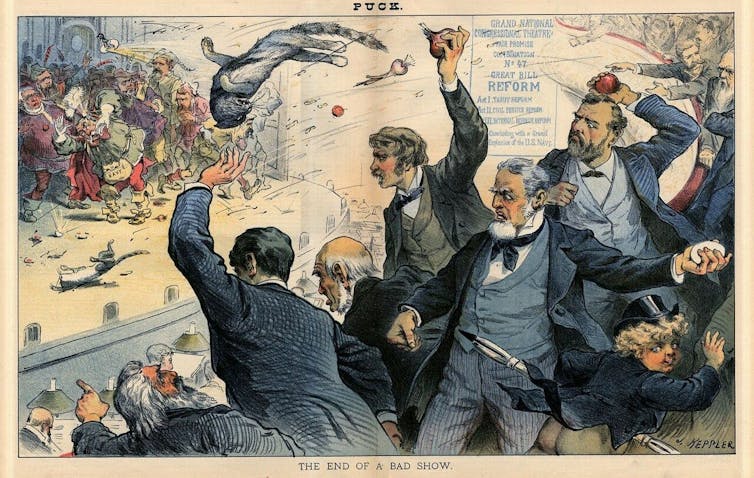All shook up? UK’s Nigel Farage is the latest to bear the brunt of pelting as popular politics
From ancient Rome to modern times, pelting has been a performance of crowd defiance in all its joyous, furious and lawbreaking glory.

Nigel Farage, a U.K. politician known for his populist anti-European Union rhetoric, endless media appearances and close friendship with Donald Trump’s MAGA Republicans, received an unwelcome treat while out on the U.K. election trail on June 4, 2024: a milkshake, directed at his face.
He isn’t the first to suffer such a fate. Angry citizens have been throwing everything from stones, eggs, pies and more recently milkshakes to register their complaints with authority for centuries.
I am an anthropologist who studies popular democracy and has written on how pelting as a show of collective grievance has lost neither its significance nor its frequency.
Throwing things and pelting as a form of popular politics is an ancient and enduring way for the masses to express their dissatisfaction with authority and the status quo.
Egg on their face
The Roman emperor Vespasian is one of history’s early known targets of protest pelting. According to accounts, in 63 CE, ordinary Romans, frustrated by food shortages, attacked Vespasian with turnips. Similarly, Emperor Nero reportedly faced the ire of dissatisfied citizens, who pelted him with onions in the Colosseum.
Much later, Bram Stoker – the Irish author of the 1897 novel Dracula and a long-time theater manager – quipped that as criticism goes, being pelted with eggs amounted to a positive review compared to having bricks thrown at you.
But throwing eggs can be injurious, too – just ask the U.K. protester who in 2001 dared to throw one at then-Deputy Prime Minister John Prescott. Prescott, a former boxer in the merchant navy, responded with a neat left jab to the jaw and a scuffle ensued.
Milkshakes have taken over from eggs in more recent years as the protestor’s projectile of choice – and for Farage, this wasn’t his first dousing. In 2019, an anti-Brexit protester emptied a milkshake on the right-wing politician. In a video of the incident, you can hear one of Farage’s entourage muttering, “Ah, not again!”
And in the U.K., it isn’t just politicians – British royals, too, are acquainted with the tradition.
After King Charles inherited the British throne in 2022, raw eggs were thrown his way twice in one month, including at a public appearance where he unveiled a statue of his mother, the late Queen Elizabeth II. The assailant on that occasion was hauled away shouting, “This country was built on the blood of slaves” and “Not my king.”
Queen Elizabeth II, who died on Sept. 8, 2022, was a victim of egg-throwing herself more than once, and with more accurate results. During a 1986 trip to New Zealand, one egg hit the queen’s coat, and egg yolk trickled down her pink dress. Another egg splattered on the car’s windshield, according to media reports.

A show of collective grievance
Pelting may be seen as the act of a hero or a villain – one example might be Muntadhar Al-Zaidi, the Iraqi journalist who threw his shoes at President George W. Bush – but the act remains a performance of popular defiance.
Pelting connects the person pelting with their enemy through a physical object. Russian philosopher Mikhail Bakhtin described something similar when discussing the medieval carnival and the “carnivalesque.”

While those throwing the objects often see retribution, be it through arrest or punishment, to see the projectiles as weapons of the weak misses the point.
The ritualized aspect of pelting doesn’t diminish its enjoyment, and the carnal element reminds us that even in today’s popular democracies, “the people” still may resort to physical protests to signal grievances to those who wield power.
To targets such as Farage, it can be an annoyance, an embarrassment and an additional trip to the dry cleaners. But to those who wield the milkshake, it can be a moment to shake up the establishment, so to speak.
Nusrat S. Chowdhury does not work for, consult, own shares in or receive funding from any company or organization that would benefit from this article, and has disclosed no relevant affiliations beyond their academic appointment.
Read These Next
Massive US attacks on Iran unlikely to produce regime change in Tehran
President Trump has appealed to Iranians to topple their government, but a popular uprising is unlikely…
Iran will respond to US-Israeli strikes as existential threats to the regime – because they are
The latest attack on Iran goes far beyond previous operations by Israel and the US in both scale and…
Cuba’s speedboat shootout recalls long history of exile groups engaged in covert ops aimed at regime
From the 1960s onward, dissident Cubans in exile have sought to undermine the government in Havana −…






